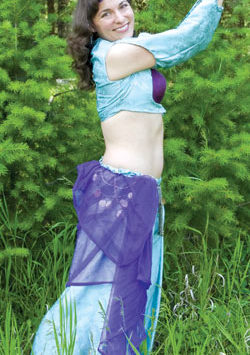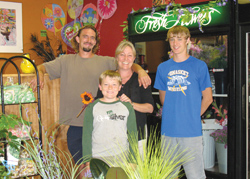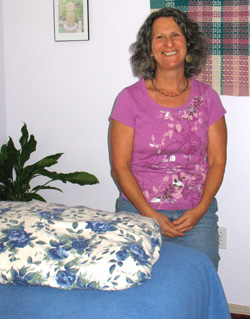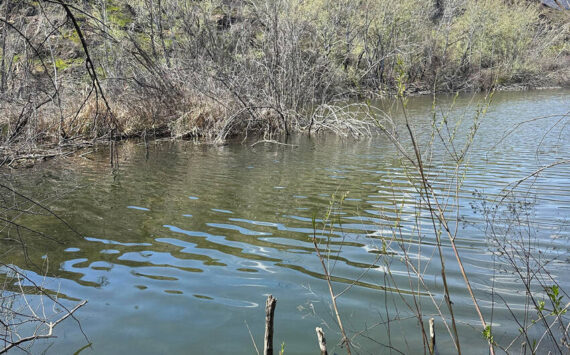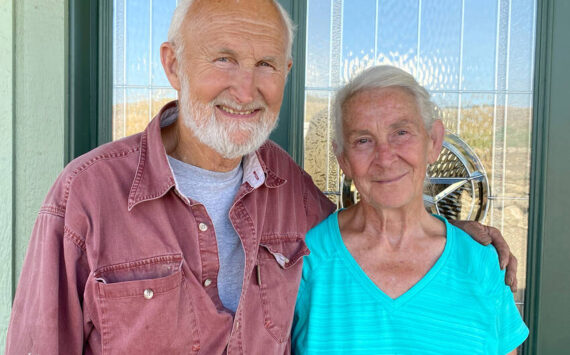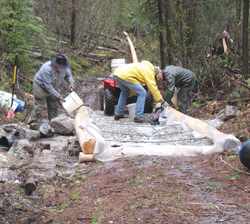 Photos by Amy Veneziano
Photos by Amy Veneziano
From left, Dave Sunde, Trygve Culp and Tom Winsor dump gravel on a newly-installed turnpike at the Antoine Trail last week. This spot is about a mile from Forest Service road access.
” title=”385a” width=”” height=”” class=”size-FULL”>
Photos by Amy Veneziano
From left, Dave Sunde, Trygve Culp and Tom Winsor dump gravel on a newly-installed turnpike at the Antoine Trail last week. This spot is about a mile from Forest Service road access.
ANTOINE TRAIL, HAVILLAH – Digging holes doesn’t immediately come to mind as an activity for a group called the Backcountry Horsemen.
But on one rainy spring day, it was exactly the plan.
About 8 members from the Backcountry Horsemen (BCH) groups in Ferry and Okanogan Counties gathered at the Antoine Trail Head off Havillah Road in the Okanogan National Forest to clean up and maintain a bit of the trail, used by riders and hikers.
“The trail is in pretty bad shape,” said Okanogan chapter member Dave Sunde, wielding a shovel. “It’s in danger of getting washed out.”
Sunde said the BCH was putting in turnpikes and culverts on the trail, about four miles away from a small-car-friendly road, to make it safer and move water away from the well-traveled route.
While the members worked June 4, rain coming down and springs from the mountain proved the necessity.
“I’ve never seen water like this so late in the year,” said BCH member Trygve Culp.
Though most work is done by a volunteer group who pays for their own gas and arrives with tools and lunch in-hand, the work at Antoine was done using two grants the BCH recently received, Culp said.
Myrna Hughes was able to bring sack lunches for all the workers.
A two-year, $75,000 grant was awarded to the state BCH by the Washington Recreation Conservation Office, he said. The National Recreation Trails Grant was distributed to various county-level groups to do trail work, he said.
“We’re fixing trails to make them usable for everybody, not just horses,” he said.
The second grant was awarded by Congress, he said. The Title II Secure Rural Schools and Community Self Determination Act helps to make up for a loss in logging revenue in national forests, Culp said. All counties which have portions in the Wenatchee-Okanogan National Forests receive some of the money, he said.
“There’s some discretion in how it’s spent,” Culp said. “Most of it goes towards roads and schools, but some can be held for other projects.”
Culp and BCH-Okanogan president Dave Swandberg requested money from the grant through the Okanogan Trails Coalition, a 501(c)3 organization. They received $3,400 for the project, he said.
“With these two grants, we were able to reimburse for fuel, food, materials – gravel, the culverts, and other items,” he said.
The turnpikes get water off the trail, he said, making it safer to travel for horses and hikers.
The wet spring has delayed work on the trail, Culp said.
“Most years there’s not this much water there,” he said. “The soil was saturated at that spot.”
So far, only one turnpike has been built. They plan to wait until the trail dries out to build the final three, he said.
“We were ruining the trail trying to fix it,” he said.
Several members of the Ferry County chapter also came to the Okanogan National Forest work site.
Roxy Pelton and George and Lou Young came from Ferry County. Other Okanogan Valley chapter members included Peggy Swanberg and Tom Winsor.
The group has other projects going to keep their hands full, Culp said.
They’ve rebuilt corrals on Bannon Mountain and will build a stock ramp later in the summer, Culp said.
They also put in a picnic table and fire ring, as well as an outhouse installed by the forest service.
“It’s coming along pretty nice,” he said.
There are nearly 100 registered members in the Okanogan Valley chapter of the BCH and 3,200 members state-wide, Culp said. There are three groups in Okanogan County, include the Okanogan Valley chapter, the Methow Valley Chapter and the Tri-Rivers Chapter in Pateros.
“People all over have joined just because they believe in the cause,” said club vice president Gail Sunde. She spent more than six hours on the phone last week seeking out volunteers for the Antoine project. Sunde was unable to attend the work day due to injuries from an accident.
But the biggest problem is getting the manual labor to show up, Culp said.
“We have a hard time getting enough volunteer hours to do the work,” he said. “People will only commit to so much before saying ‘hold on, I’ve got another life,'”
The BCH is the second-largest trail working organization in Washington, Culp said. A total of 62,000 volunteer hours was contributed in 2007, which is close to 30 individual work years. The Okanogan County chapter put in 780 man-hours.
“Compared to the number of horses in the state it’s not that big,” Culp said. “But we donate more hours to trails than any other organization besides the Washington Trails Association.”
Dave Swanberg is the president of the club. Gail Sunde is the vice president and Culp is the director. Tom Winsor is the supervisor of trail projects, Dave Sunde is the legislative chair, Verna Hughes the social director and Linda Parker is the treasurer.
